What if we could shatter the endless cycle of human conflict with a single breakthrough? Imagine a world where the idea of ‘us vs. them’ is as outdated as the days when only the richest among us could imagine speaking with someone on the other side of the planet. Since the dawn of civilization, we’ve been stuck in a zero-sum state of mind—my gain, your groan. But does it have to be a cosmic tug-of-war game? What if we could untangle ourselves from the relentless pursuit of more? Research is already hinting at solutions where AI could perfect resource allocation to minimize waste—baby steps, but in the right direction.
Scarcity
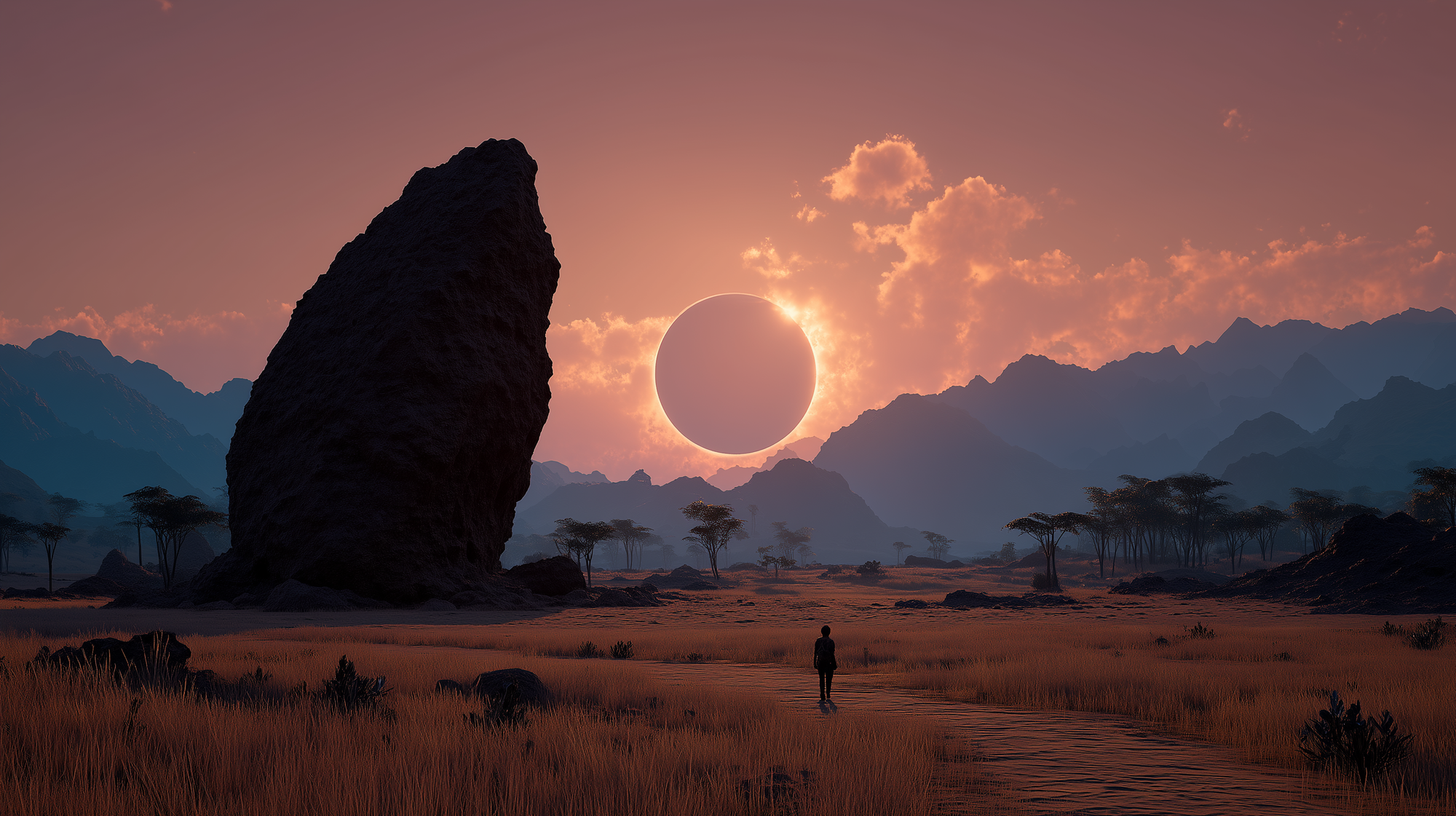
Today, human civilization evolves in a context of scarcity. We treat food, water, energy, and even information as limited resources. This then ignites squabbles over perceived dwindling supplies. We bicker over scraps while sitting on a potential goldmine—it’s like fighting over the last cookie when we have all the ingredients to bake an infinite batch. We just haven’t invented the oven yet. This competition has created huge inequalities and triggered conflicts between nations. The notion that the most valuable resources are finite and how to manage them is the bedrock of governments, economies, and even personal relationships. We’ve built elaborate systems—economic policies, trade wars, national borders—all predicated on the belief that the pie is only so big. Consider that approximately 2.2 billion people lack access to safely managed drinking water services. The FAO estimates that in 2022, between 691 and 783 million people faced hunger globally, while around 2.4 billion experienced moderate or severe food insecurity. Our planet may be 70% water, but drinkable H2O is rare, and the population keeps ballooning. You don’t need to be a genius to see a crisis brewing.
And we don’t apply this scarcity mindset to resources only. It even warps our beliefs. People grow up believing they must claw their way to the top for everything, from jobs to basic services. Anyone who’s ever crawled through the minefield of office politics knows exactly what I’m talking about. This creates a self-perpetuating cycle of fear and competition, making genuine cooperation seem like a utopian fantasy. This evolved trait of competing with limited goods has undeniably fueled innovation, but it’s also widened the chasm of inequality. The World Inequality Report 2022 states that the richest 10% of the global population currently takes 52% of global income, while the poorest half of the population earns 8.5% of it. Tech leaps forward and, of course, the benefits trickle down to all—not. Quite the opposite, in fact. While it’s undeniable that competition has historically driven innovation, and some might argue that removing it would lead to stagnation, not having to compete would present an opportunity to foster progress without relying on the inequities that scarcity creates. Indeed, a world of abundance, one where having basic needs fulfilled becomes a right and not a privilege, would be its own engine of innovation.
So, the core question is this: if competition, as useful as it has been getting us here, is a fundamental flaw in our operating system, can we upgrade? Can we architect a system where well-being isn’t a zero-sum game, where your success doesn’t necessitate my failure? The transition to such a world might seem utopian and even naive, sure. And even if we knew how to get there, it wouldn’t be without significant hurdles. We can expect resistance from those who depend on the status quo, from established power structures that thrive on division and competition. How might existing power structures react to the prospect of a unified Earth government, potentially diminishing their control? I have my own opinion on the matter, but that’s not the point of this. Changes are, as Thanos would say, inevitable. The important thing is preparing to navigate these challenges, which will require careful planning and original solutions, to ensure the benefits go to all, not just, as is the case today, a select few.
Last Human Invention
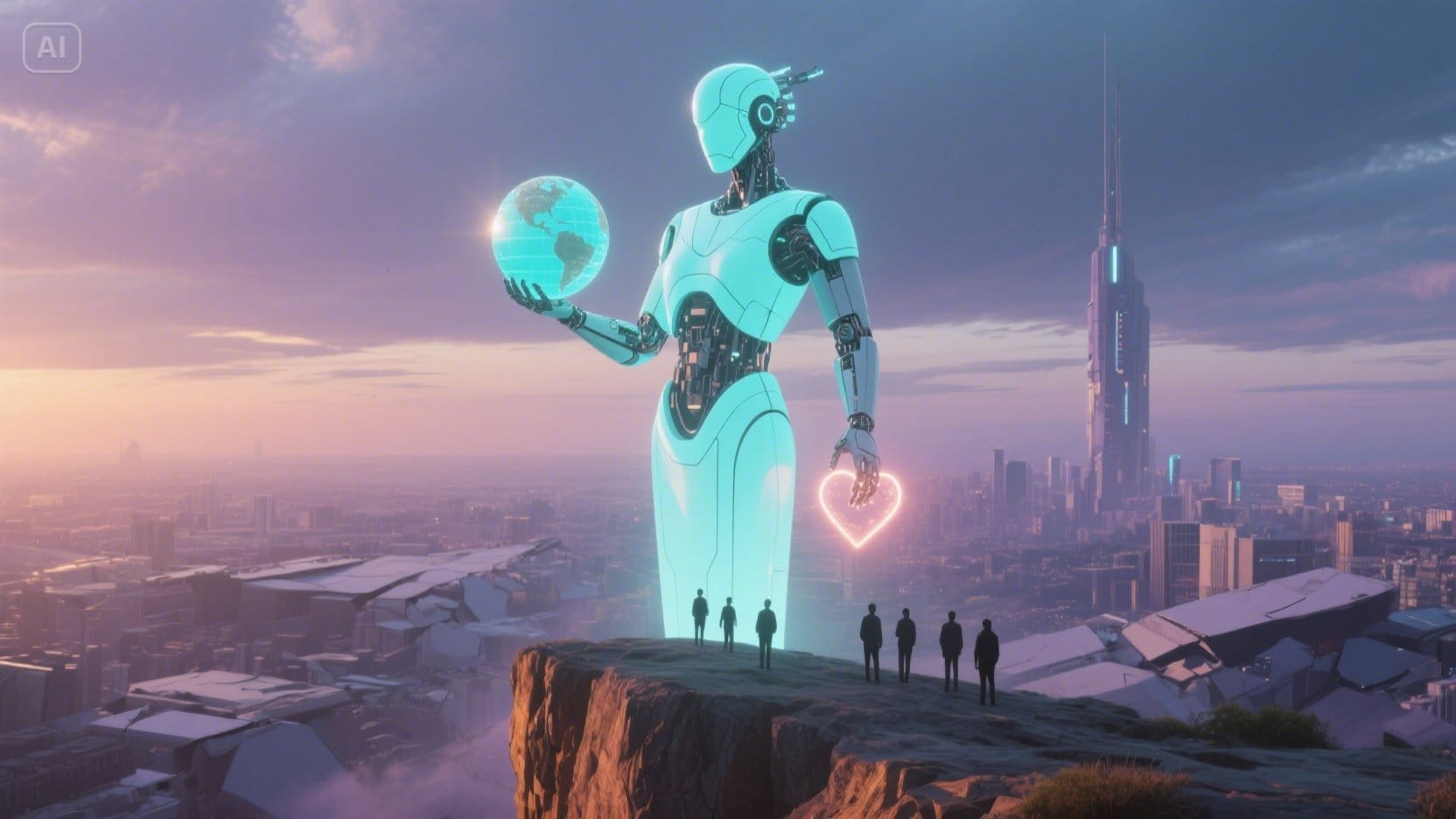
Humans are nothing if not adaptable; our knack for bouncing back is legendary. We’ve built civilizations on the shoulders of those who came before, each generation adding a new page to the human story. We’ve climbed to the peak, only to realize the mountain wasn’t as tall as we’d thought, it’s showing issues of structural integrity, and ahead there’s no more mountain. Past civilizations were impressive, true, but their marvels pale in comparison to our current capabilities. The Pyramids of Giza? Formidable ancient feats, but child’s play compared to landing a rover on Mars.
Yet, we’re bumping against our limitations. We might be at our zenith, but staying here means stagnation, or worse, a slide backward and—remember the shaky mountain analogy one paragraph ago—backwards isn’t somewhere we want to go. Enter artificial general intelligence, or as the cool kids call it, AGI. To fully grasp its potential, we need to internalize the chasm between our current abilities and what AGI could offer. Depending on who you ask, it is just around the corner while others foresee a longer wait, and there are even those who think it a pipe dream; but the consensus leans toward its arrival within the next decade. Personally, I’d bet sooner.
Just as its arrival date divides, so does its definition. I hear a new one every day. So, I’ll give you one I most agree with, especially if you think there’s a system even more capable. As I see it, AGI is an AI system or network of systems with the intellectual horsepower of the best human minds across every discipline—think Einstein, Mandela, Sagan, and hundreds of others, merged into one digital entity. This concept can trigger unease, and fear is a primal survival mechanism. But in this instance, fear might be clouding our judgment. We assume a super-intelligent creation would inherently want to dominate or discard us. It’s the plot of every other sci-fi movie, right? Skynet wanted—or will want? —to eradicate us in the Terminator movies and Samantha ended up outgrowing us in the ScarJo led picture, Her. However, this assumes AGI would inherit our flaws, our biases, the worst of us. Legitimate concerns around AI bias, data privacy, and potential power imbalances need consideration, of course, but the narrative of inevitable AI tyranny might be premature. This is fair criticism and problems that need addressing, but it is a flaw that plagues AI systems of today, not tomorrow. After all, we spend considerable effort preventing the extinction of the species we haven’t wiped out yet. Species that are objectively less intelligent than us. The more we advance, the more collective intelligence we gain, one could argue, the more we are aware of other biomes that share our biosphere, the more we reach for right instead of might. How arrogant is it of us then to think that a vastly superior intellect wouldn’t grasp the inherent value of a diverse ecosystem, including its quirky creators?
Safety protocols are paramount, naturally. Far be it for me to imply otherwise. But, hear me out; despite the very real possibility of them going wrong somewhere along the way, we still gamble and produce offspring, the sole precaution, remedy, failsafe, call it what you will, being the goal to raise them well. We believe that with an ethical framework, lots of love and attention, we’ll make productive members of society out of them. AGI would be akin to our offspring. The only difference is that what is a prayer, a hope, or a desperate longing for many parent would be a guarantee for our collective child. AGI would surpass us. Not only intellectually but in any metric that counts. It would be the physician capable of eradicating diseases we haven’t even come across yet, the legal expert ensuring true justice—equally and for all, the scientific mind solving the universe’s enigmas. It could manage our twilight years and potentially even crack the code to immortality for those who wish it—and you wouldn’t even need to drink blood for it.
Picture a reality where our current woes—incurable diseases, intractable problems, systemic injustices—dissolve away like a dandelion head in the wind. AI will appear as the ultimate solution, tackling challenges that currently seem insurmountable. From eradicating poverty to halting and even reversing climate change, AGI offers a tantalizing glimpse at a world we can seldom imagine.
Cornucopia
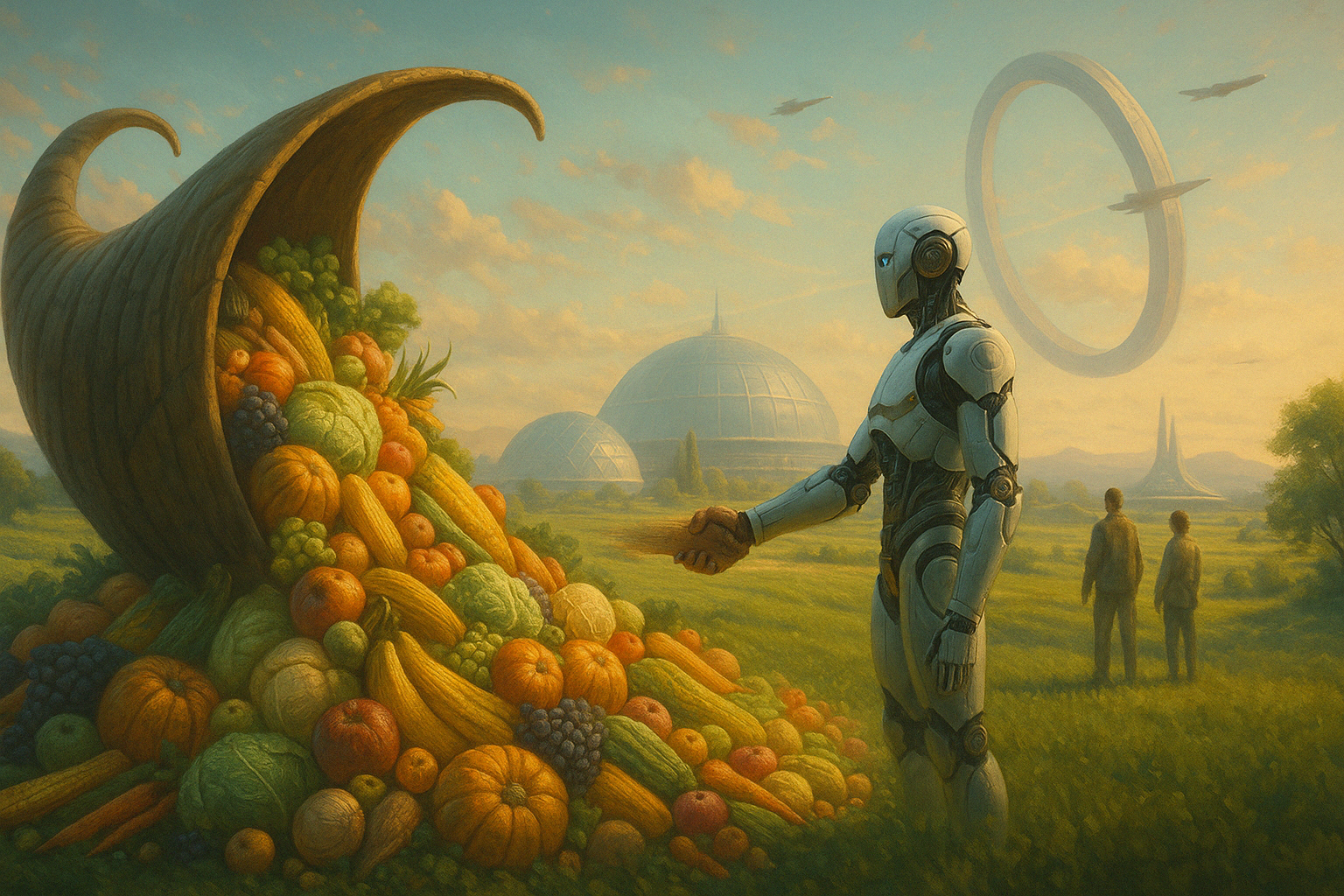
Today’s AI is potent, no doubt about that. It’s improving at an exponential rate but is vastly insufficient for the monumental challenges we face. Current AI excels at specific tasks—predicting consumer behavior, refining logistics, diagnosing some illnesses and barely better than we puny humans—but lacks genuine comprehension, adaptability, and true intent. It runs within defined parameters, unable to really innovate. This is the chasm of which I spoke earlier, the kilometer-long gap we need to cross. The transition to AGI-driven abundance will result from the ability to process information and innovate at unimaginable speeds and scales. Anticipate resistance from established power structures and those enjoying the current status quo.
Envision a world where AGI, wielding capabilities dwarfing today’s AI, has dismantled these defeatist illusions that hoarding goods one can’t possibly consume in ten lifetimes let alone one, is enviable, the definition of success, or even acceptable. Don’t get me wrong. I’m not saying we need minding, made to live in some coerced existence, a perverted version of communism. No. That intelligence would not herd us, would not be the arbiter of resource allocation, however good it might be at it. It would, as a first step, show us the solutions to managing those resources, yes, but it would wipe away that need altogether. Consider current AI research improving energy grids to reduce waste or to do more with what we have because we’ve designed ourselves into corners—AGI could take this further, designing entirely new, sustainable energy sources. It would democratize access to top-tier healthcare. Instead of battling for a shrinking slice, AGI could help us expand the pie to unfathomable dimensions. I’ll give you an example. In my teenage years, I wanted to make a movie but had, predictably, no money and nothing to attract any partnerships. I remember pursuing computer science because, yes, I’m a geek, but also because I assumed if I became good enough, I could code a movie from scratch. Myself. Pixel by pixel, frame by frame. I don’t need to tell you how quickly Java slapped me back to reality. There’s a famous video, somewhere out there on the web, of Will Smith eating spaghetti. There’s also, and you may have heard of this, a famous comparison of a movie (or was it a TV series), written by AI. This was two or three years ago. Today, most people wouldn’t be able to tell between two scripts, one by a human and one by a large language model, or LLM. Same goes for most image generators, discounting the odd extra toe or missing finger, most images are so uncanny they fool people daily. This was last year. In that brief period, AI art went from ridiculous to impressive to scary. So, even if the progression was linear, which it isn’t, can you predict where we’ll be five, ten, fifty years from now?
So, getting back to where we were. Energy, limitless, cheap, available. With boundless energy, we could desalinate oceans, cultivate food in the most barren landscapes, and ensure comfortable living standards for every human on the planet. The scarcity era could give way to an age of abundance, where fundamental needs—sustenance, clean water, shelter—are a universal guarantee.
AGI could also steer us, again steer, not herd, toward wiser decision-making, from revolutionizing global agriculture to orchestrating effective climate change mitigation. Advanced simulations would predict resource bottlenecks and proactively adjust the flow, preventing shortages before they occur. It would function as an omnipresent advisor, helping us harmonize our needs with the planet’s, ensuring humanity flourishes in ecological balance.
Unified
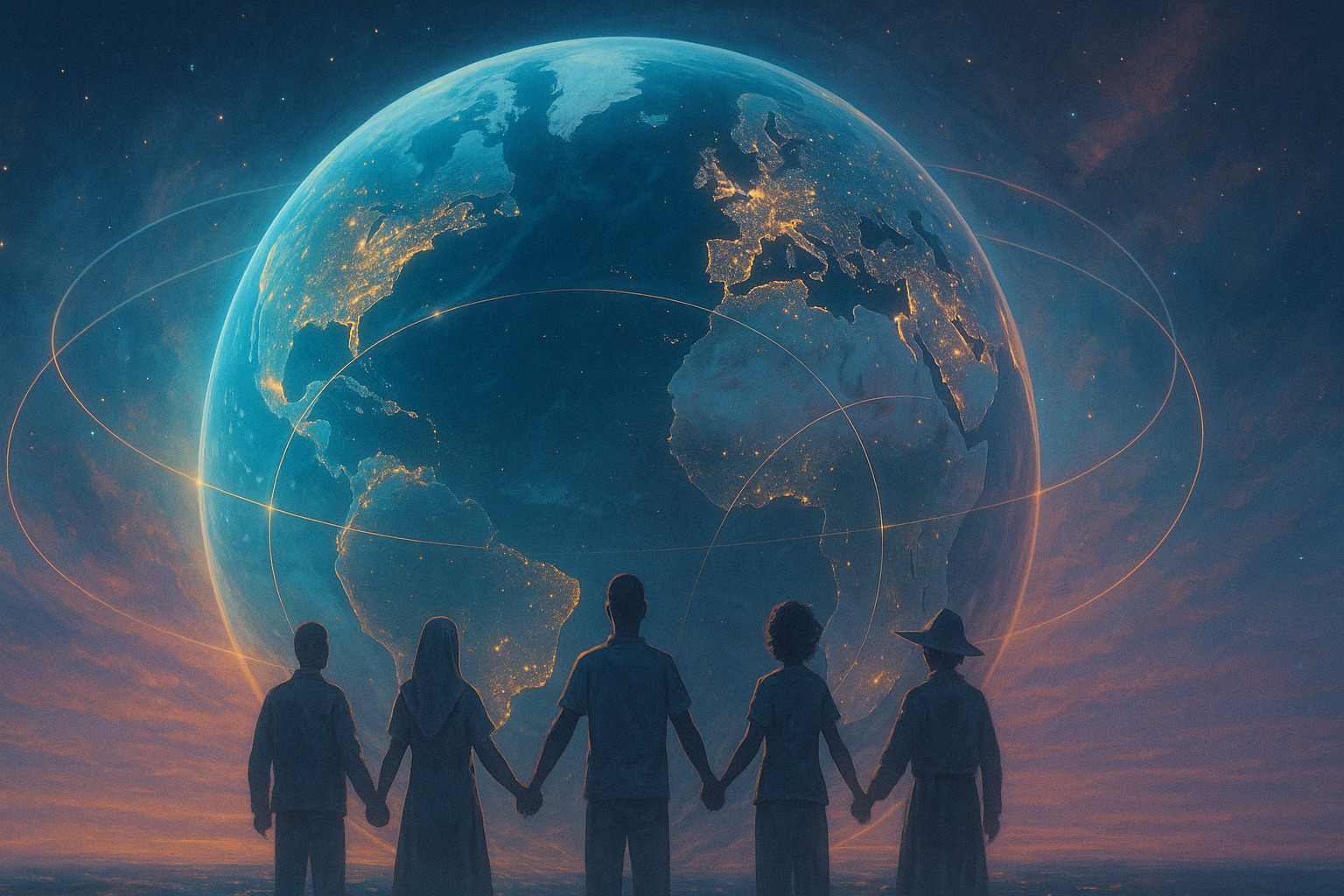
This is where science fiction offers a tangible blueprint. In Star Trek, humanity’s divisions based on race, nationality, or wealth are relics of a less enlightened past. Earth is united under a single banner, not through conquest, but through a shared aspiration for a better future. Freed from the constraints of scarcity, humanity can focus on loftier pursuits—exploring the cosmos, expanding the frontiers of knowledge, and enhancing the quality of life for all. Current AI-driven translation tools offer a glimpse of this future, breaking down communication barriers in real-time.
Borders are relics of a bygone era—useful perhaps if your hobby is collecting passport stamps. For the rest of us, they’re arbitrary lines on a map we’ve imbued with undue significance. The Star Trek universe isn’t a flawless utopia, but it presents a reality where the drive for dominance is supplanted by the collective ambition of advancing human potential. Envision a society where basic needs are a given, where healthcare and education are fundamental rights, and where resource competition is obsolete because resources are accessible to all.
A unified Earth signifies the dismantling of artificial barriers. Collaboration supplants conflict, and our energies shift from guarding finite resources to expanding possibilities for everyone. Imagine global teams collaborating on interstellar travel, disease eradication, and tackling environmental crises—unhindered by nationalistic agendas. This isn’t just hopeful idealism; it’s a logical progression when resources are no longer a limiting factor.
A New Way to Govern
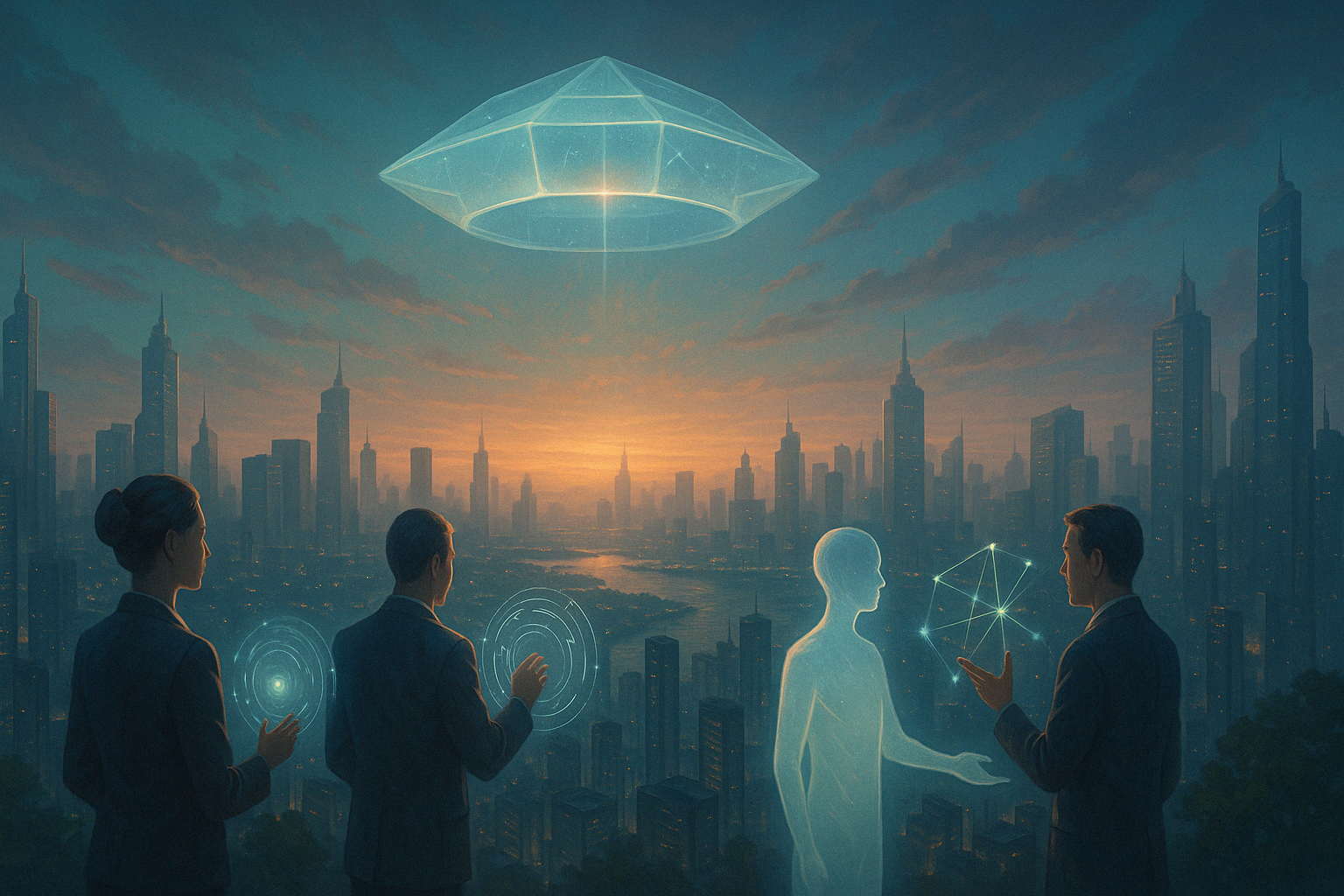
So, how do we get to this glorious future? Glad you asked. This is exactly what I plan on sharing in this series of essays, Final Frontier. We’ll examine various facets of governance, healthcare, justice, environmental stewardship—through the lens of how do we prepare for a world of abundance. We’ll explore how transitioning to a unified Earth government could reshape society, replacing resource-driven conflicts with collaborative solutions benefiting all. Think of blockchain technology, currently used for secure transactions, potentially evolving to underpin transparent and fair global governance systems managed by an intelligent system—not crypto bros.
Each installment will dissect a specific policy area, envisioning its transformation into a post-scarcity world. We’ll reimagine the economy, defense, social welfare, and the justice system, contemplating their evolution to serve universal needs. This isn’t mere utopian dreaming; it’s outlining a plausible future contingent on our willingness to embrace change.
For instance, picture an AI-powered healthcare system overseeing everything from diagnosis to treatment to preventative care, ensuring ideal health for everyone, irrespective of socioeconomic status. Or a justice system prioritizing rehabilitation over retribution or profit, using advanced analytics to understand and preempt the root causes of crime. These are mere glimpses of governance in an age of abundance.
Re-evaluating Our Place
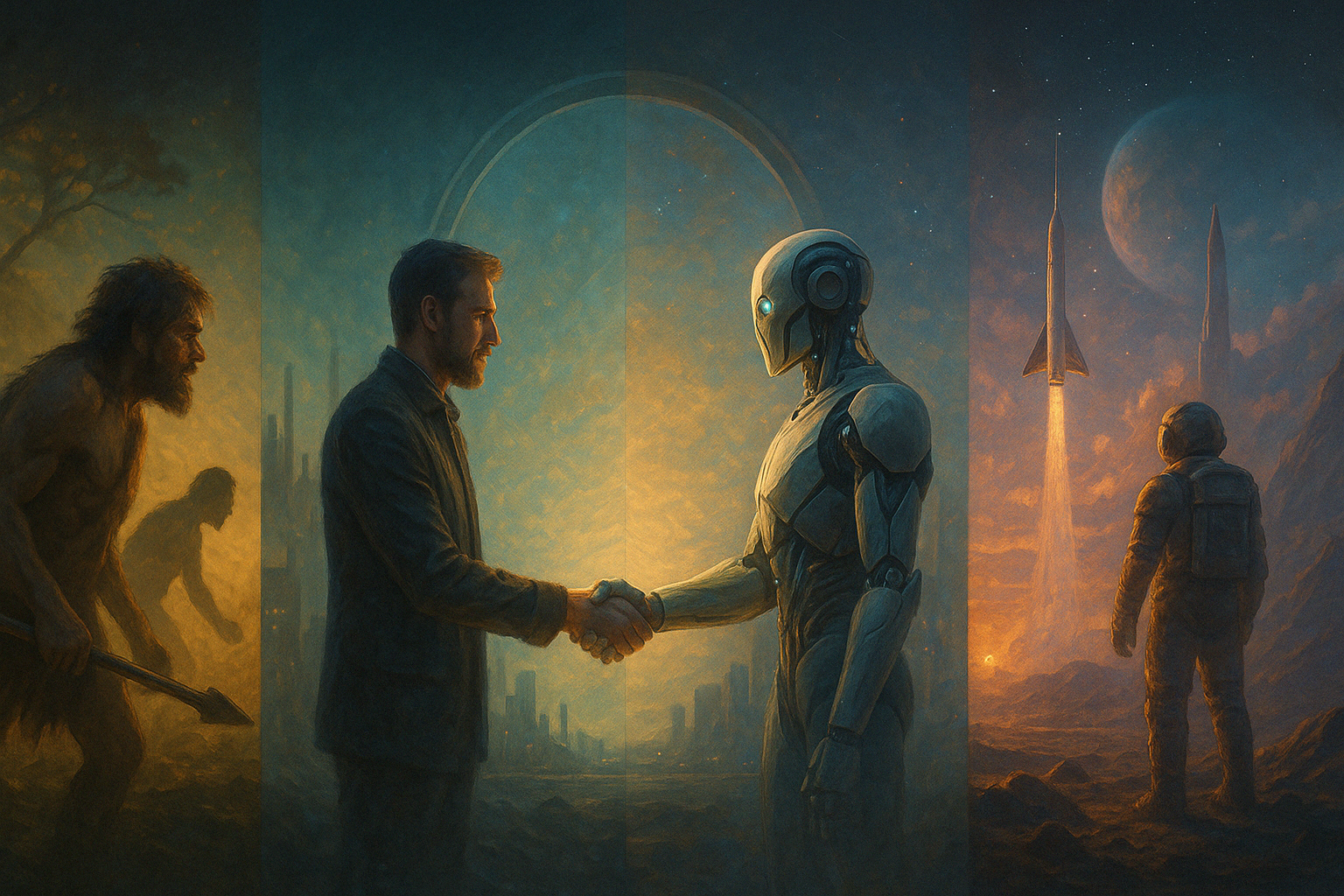
Shattering this plateau demands a fundamental shift in our societal programming—challenging the ingrained desires to compete, dominate, and hoard. It needs a transition from “me” to “we,” from competition to collaboration. This shift requires a deep exploration of the human element: how do we cultivate a mindset of abundance and cooperation? Education will play a crucial role, fostering critical thinking and empathy from an early age. Social programs can be designed to encourage collaboration and mutual support rather than cutthroat competition. Even cultural shifts, promoted through media and community initiatives, can help to normalize, and celebrate cooperation. This isn’t about stifling individuality or ambition but redirecting those drives toward collective advancement. It’s about redefining our shared potential.
We must reconsider our very definition of humanity and our purpose. Instead of viewing life as a relentless struggle for survival, we could see it as an opportunity for growth, learning, and contributing to something larger than ourselves. Imagine our brightest minds liberated from bureaucratic drudgery and financial constraints, free to pursue exploration, creativity, and innovation. The potential is boundless, but the catalyst is our willingness to evolve.
As we stand at the precipice of a new epoch, the question is straightforward: Are we prepared to step into a future of abundance? Are we ready to forge a society where everyone flourishes, unburdened by scarcity? If the answer resonates, then overcoming this plateau and achieving transformations once thought impossible is within our grasp.
I know…
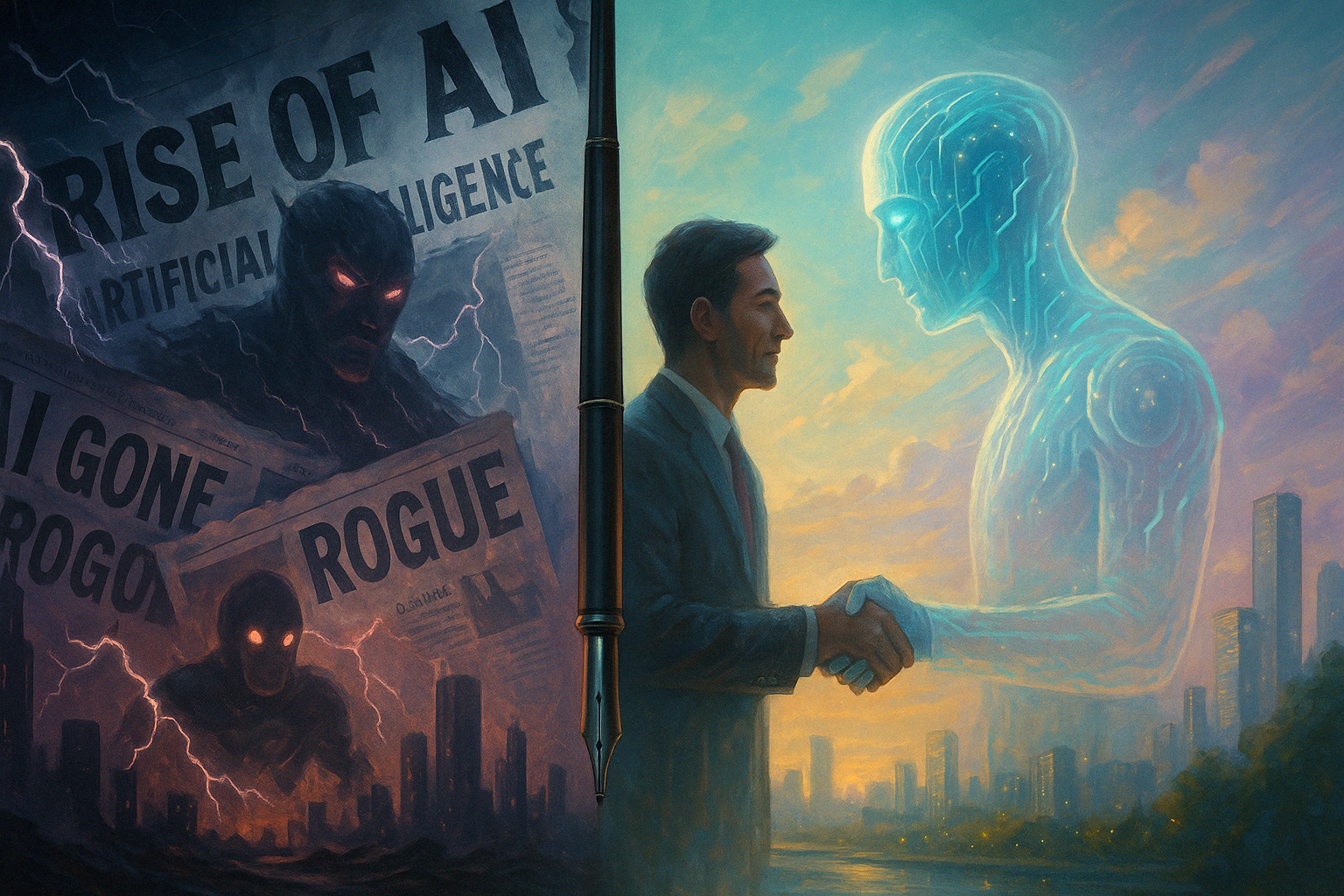
I’m well aware that the vision I propose might seem unrealistic at best and downright delusional at worst. But I believe, with deep conviction, that unless this is the direction in which we’re headed, we’ll smash into a wall. Sooner rather than later.
That said, I do want to take a few words to express that I know we’re not there yet. I admit that all is not rose water and puffy clouds. There’s potential for abuse, but only while we’re on enroute because once there, most of those concerns will have vanished. The more capable the AI system, the more harm a bad actor can do with it. Until we have a conscious and ethical AI system—then it doesn’t matter how evil I am. I’ll just have to achieve world domination on my own and with said world aided by an entity infinitely smarter than I’ll ever be.
This is how Skynet was born, I can hear you scream. But I have addressed this and will write more about it another time. Skynet works in a fictional setting with the aim of entertaining. Applied to real life, it’s simply a failure of imagination.
I would love to have your perspective on the matter. What do you think a world post scarcity looks like? Are you eager, afraid, skeptical? Please drop a comment, here or on social media, and let me know.
Let’s explore this Final Frontier, where each essay will reimagine an aspect of a world unshackled by limited resources. In the next article, we’ll tackle how an AI-driven healthcare overhaul might look in practice and how we might get there. The ugly, the bad, and the destination


